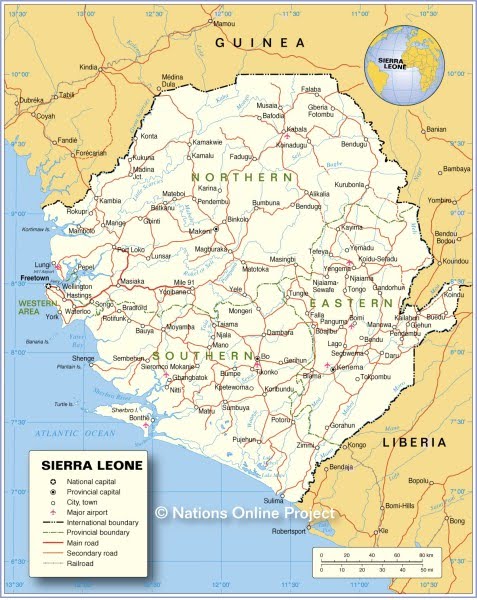
Given that very few changes of address require no physical or emotional adjustments to be made, it is to be expected that a move from the principle city in Scotland to the capital of Sierra Leone, will involve numerous changes to daily living but some of the differences, apart from the climate, might be surprising.
On rising each day, after stepping outside the mosquito net, the hope is that water will have trickled through the thin plastic pipe into the holding tank to replenish the previous day’s consumption. This will have included preparing and cooking food, showering three times a day and hand washing laundry. The water provided by the Goba Valley Water Company, is not considered drinkable and as we have yet to find a domestic water filter, we buy this precious liquid in the largest available size, 1.5 litre plastic bottles. It has been ten weeks since it last rained and it might be another 12 or more weeks until it does, water conservation is a constant theme running through every day.
As it is the dry season we can eat all meals on the veranda. Whilst doing so, we listen to the radio news on countries and places within Africa that tests our knowledge, especially on their location, with good use being made of the map in the Methodist Church’s Prayer Handbook. When living in the UK, Radio 4’s “thought for the day” was anticipated on most days, whereas as now it is the broadcasting of African proverbs, which gains our habitual attention on the BBC’s World Service, spoken first in the person’s mother tongue, then in English, and sometimes followed by an explanation as to its meaning.
Living without a car also changes the manner in which food is both acquired and transported from the various open markets and supermarkets. To make life easier we ask the gate man, Mr Jalloh, to purchase the daily bananas, pawpaw and oranges from passing street vendors. Numerous food items which would have been on a UK shopping list, celery, broccoli, leeks and mushrooms are not available, whilst others, including hard cheese and dark chocolate are not affordable and in the absence of fresh milk, powdered milk is an essential, as are mosquito coils, but not for eating. Finding bottled gas for cooking is not as big a problem as transporting it home or cooking in the oven that consumes it.
The mosquito coils are particularly helpful if we choose to stay on the veranda long after the sunset at 6.30pm to witness the arrival of the Scope Owl which, in the gloom seems to be watching us as much as we watch him/her. Our observation of other birds and their mating patterns along with watching goats being born and now growing, has been far more than just interesting. Being just 8 degrees north of the equator, the sunrise and sunset times have varied only by a few minutes since we arrived in early November, but without rain the gradual browning of the plant life close to the ground is very noticeable.

Accessing money in the local currency is a challenge. Obtaining cash from the bank involves a lengthy bank counter procedure. There are “holes in the wall” to access it electronically, but, as the largest denomination is a 10,000 Leone note , the equivalent of £1.60, a huge wad of notes have to be carried when planning to purchase significant items. Plastic cards do exist, but are not used for general buying nor are cheques acceptable in many establishments. Having carried sterling with us from the UK, we are still using that, which means deciding which money changer on Siaka Stevens Street is offering the best exchange rate, and then getting him to increase it by 500 Leones on the basis that we are exchanging crisp, pristine pounds sterling for grubby and dog eared Leone notes. The carrying of anti bacterial gel in the absence of running water in cafes and restaurants is a “must” for hygienic drinking and eating.
Just leaving the house to go to the Sierra Leone Theological College (SLTC) is a 20 minute procedure. Laptops are put back into a bag, and locked safely away, keys are hidden, bedroom doors locked, then you have forgotten something, so the procedure in reverse, then sun cream on, water bottles filled, check you have enough money for what you want to do, doors locked onto the veranda, money and bags for Mr Jalloh to do the shopping , making sure you have a hat for the sun, and then out the door, its locked and the key left with someone, just in case the plumber, electrician or carpenter need to get in. Then down the road to find a taxi, greeting folk on the way, all of which has been written about in a previous blog.
And now we are becoming part of the life of SLTC as well as the Methodist Church. Names are being learnt, materials prepared, and the discovery that all photocopying is done elsewhere. The YMCA just up the road is recommended so off we go with our books and list of pages to be copied, to discover that it is Janice who has responsibility for this work, and that she got her name as a result of an American doctor operating on her harelip as a baby. And if our timing coincides with lunchtime, then the YMCA does a good groundnut soup with rice and fish, heavily spiced with chillies which bring an additional sweat to the brow.
As may be evident,the details of daily living add to the delights and surprises of living in Salone.


No comments:
Post a Comment